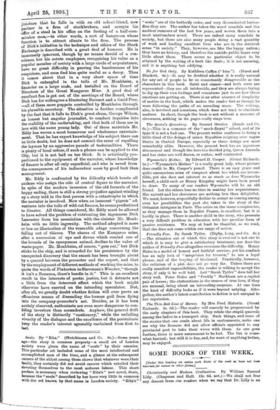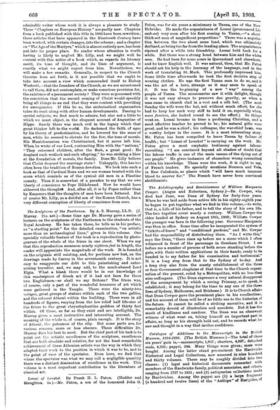SOME BOOKS OF THE WEEK.
[Under this heading we notice suds Books of the week as have net ban reserved for review in other forms.] admirable writer whose work it is always a pleasure to study. These "Chapters on European History " are partly new. Chapters from a book published with this title in 1886 have been rewritten ; three articles that have appeared in the Nineteenth Century have been worked, with certain changes, into the scheme ; and a chapter on " The Age of the Martyrs," which is almost entirely new, has been put into its proper place. No reader whose attention is worth having is likely to neglect Mr. Lilly, and we might well be content with this notice of a book which, as regards its literary merit, its tone of thought, and its lines of argument, is exactly what we might expect from him. Nevertheless, we will make a few remarks. Generally, in respect to the Church theories here set forth, is it not possible that we ought to take into account a view which commended itself to Bishop Westcott,—that the founders of the Church, as we are accustomed to call them, did not contemplate, or make conscious provision for, the existence of a permanent society ? They were so possessed with the conviction that the second coming of Christ would speedily bring all things to an end that they were content with providing for emergencies. If this be so, the ecclesiastical organisation takes its rank along with other human developments. Passing to special subjects, we find much to admire, but also not a little to which we must object, in the eloquent account of Augustine of Hippo. Surely there was much evil in the legacy which that great thinker left bo the world. He darkened the faith of ages by his theory of predestination, and he lowered for the mass of men, while he seemed to elevate for the few, the tone of morals. His Manichaeanism was Christianised, but it never left him. When he wrote of our Lord, contrasting Him with the " nations," " They esteemed children, after the flesh, a great good : He despised such wedlock and such offspring," he was striking a blow at the foundation of morals, the family. Does Mr. Lilly believe that Christ despised the marriage state ? Unhappily, this has too often been the tradition of Roman devotion. We look into such a book as that of Cardinal Bona and we see woman treated with the scorn which reminds us of the cynical old men in a Plautine comedy. Then it is somewhat of a paradox to say that we owe liberty of conscience to Pope Hildebrand. How he would have abhorred the thought* And, after all, it is by Popes rather than by Emperors that the thoughts of mon have been fettered. But of course Mr. Lilly, as a dutiful son of the Roman Church, has a very different conception of liberty of conscience from ours.



























































 Previous page
Previous page